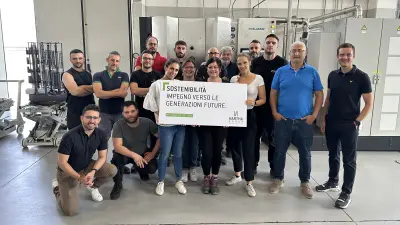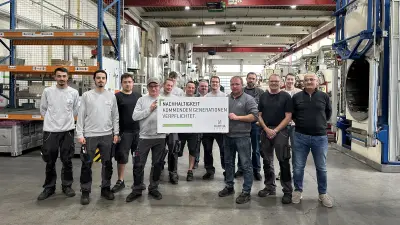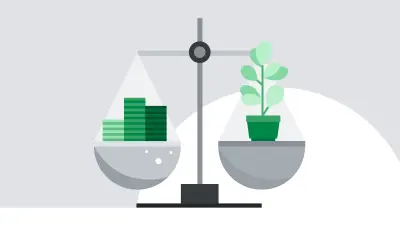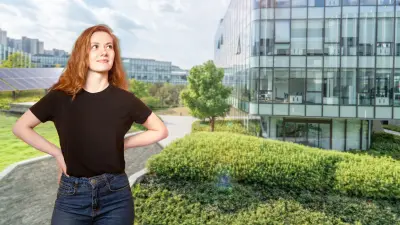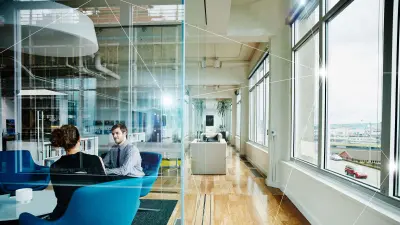“Partners like Bosch Climate Solutions help identify and implement energy-efficient solutions”
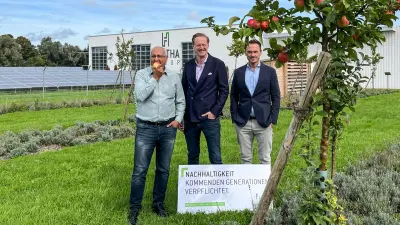
Sustainability and cost-effectiveness can go hand in hand – provided that they are effectively integrated in an enterprise’s strategy. The collaboration between the HÄRTHA GROUP and Bosch Climate Solutions is an excellent example. They teamed up to develop a sustainability and energy strategy that supports the client’s efforts to slash energy consumption and carbon dioxide emissions while actively involving its employees. In this interview Sven Killmer, the CEO of the HÄRTHA GROUP, explains how climate protection can help position his company better in the marketplace.
Mr. Killmer, you have said, and I quote: “Who says that sustainability and cost-effectiveness are mutually exclusive? Not with us!” Could you please explain what you mean by this? After all, the HÄRTHA GROUP carries out thermal treatments and coating, both of which are energy-intensive processes.
Sven Killmer: The energy crisis in 2022 made it much more urgent to achieve energy efficiency. Electricity suddenly cost several times as much. That forced us to toss out all of our calculations and act. We needed to design new transformation processes that would enable business activities that are both sustainable and profitable.
The energy crisis of 2022 hit energy-intensive companies especially hard. What did it mean for your company?
Sven Killmer: Basically, you can choose between two different strategies. Either you can freeze like a rabbit facing a snake, paralyzed with fear and hoping for better times. Or you can go into action. Our path was to develop a forward-looking strategy. We thought about how to turn the current situation into an opportunity. The amount of energy that the HARTHA GROUP consumes has a huge impact on our bottom line. So we needed a future-proof energy strategy.
How did you succeed in interpreting this difficult situation as an opportunity?
Sven Killmer: I was inspired by a statement I had heard while at college: namely, that the only way for a company to gain a competitive edge in a constantly changing world is to change even faster. I jumped on this idea. It takes a little time to get used to thinking this way. And you need a partner like Bosch Climate Solutions, which supports companies in implementing strategies that boost their energy efficiency and help them achieve sustainability goals. I attended a presentation that their managing director, Lisa Reehten, held at the Summit Meeting of World Market Leaders in the German town of Schwäbisch Hall, and afterward we started talking with one another.
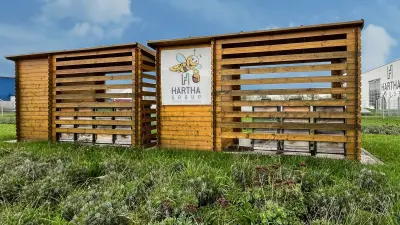
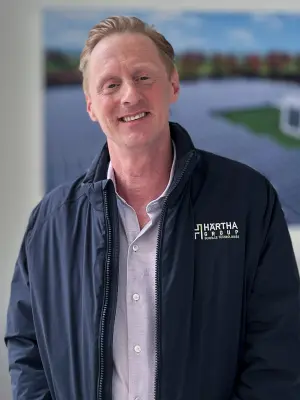
You can’t tell from a distance where it’s possible to save energy. That’s why Bosch Climate Solutions visited all of our sites. The results are better when our employees are involved and able to make suggestions.
Why is it important to work with an external partner?
Sven Killmer: You can’t just pull a sustainability and energy strategy out of a hat like a magician. It takes a lot of time, resources and money. A company has to really want to do it. Our CFO, Timo Röskes, and I therefore spent a lot of time talking with our management team. While searching for answers, we met and swapped ideas with experts, energy consultants and business auditors. It wasn’t until after that that we found out about Bosch Climate Solutions. After meeting with their experienced consultants, we immediately decided to work with them.
How did you tell that Bosch Climate Solutions was the right partner?
Sven Killmer: In order to turn a bad situation around and gain a competitive edge, you have to take fast, consistent action. I was impressed by the consultants of Bosch Climate Solutions, who have a firm grasp of theory and are also grounded in practical experience. They had already successfully carried out a whole series of projects, also at other Bosch facilities. That mattered to us, because the details are the hard part – you have to know exactly where to start. During our first meetings we were also impressed by the team’s dynamic approach; the chemistry between us simply clicked.
How did your collaboration start?
Sven Killmer: Bosch Climate Solutions prioritized the theme of boosting energy efficiency in our operations. We had already started taking steps to make our energy supply more sustainable. For example, by installing photovoltaic panels at selected locations, concluding a long-term power supply contract and committing ourselves to meeting part of our electric power needs with wind energy. Bosch Climate Solutions supported us with advice for reporting our CDP rating (according to the internationally acknowledged CDP framework for disclosing sustainability data) and for getting our emission reduction goals validated by the Science Based Targets initiative (SBTi). These acknowledgments can increase transparency, which can in turn positively impact a company’s reputation and investors’ trust.
Why did you need a partner for the topic of energy efficiency?
Sven Killmer: The migration to renewable energy can be centrally organized from headquarters. But you can’t tell remotely where resources are possibly being wasted. In 2023 we therefore held workshops at all of our sites together with Bosch Climate Solutions. We wanted to explain how important it is to slash energy consumption and reduce carbon dioxide emissions and encourage our employees to participate in measures to save energy. Our objective is to strengthen awareness of ways to use less energy throughout the organization.
-

At the workshops that the HÄRTHA GROUP 2023 held with Bosch Climate Solutions at all locations, it was explained why it is important to reduce energy consumption in order to reduce CO₂ emissions. Employees were also encouraged to participate in energy-saving measures -

So, in other words, you wanted to actively involve your employees.
Sven Killmer: When you kick off this kind of transformational process, it’s vital to make sure that every single employee understands how important the project is for the company. As the CEO, I need the teams’ support at our locations. We’re integrating the principles of sustainability in our corporate culture and decision-making processes. My fundamental motivation is to contribute to a healthier and more sustainable environment for future generations, including my own son. Most of our employees also have children or grandchildren. And the majority of people are aware of how important it is to protect the climate. There’s a broad consensus that we need to safeguard our planet for future generations.
What role does energy efficiency play for the HÄRTHA GROUP?
Sven Killmer: A really big one. As I said, the amount of energy consumed greatly impacts the HÄRTHA GROUP’s bottom line. Effective steps to use energy more efficiently can reduce consumption, contribute to sustainability and, depending on the particular conditions in each case, also lead to lower operating costs. First, however, you have to know where there is potential for increasing efficiency. That’s why it was important to us to have someone who has practical experience, takes a proactive approach, goes to the company, crawls under the machines and talks to our employees on site. In 2023 the team of Bosch Climate Solutions held the mentioned workshops at all of our facilities. They also looked at consumption and talked to our employees, who because of their experience also have ideas for saving energy. This yielded a long list of suggestions.
How did you decide which ideas to implement?
Sven Killmer: To check and grade the ideas, we applied a structured evaluation process with specific environmental, economic and strategic decision-making criteria. As a company, you can’t implement everything – you have to concentrate on taking steps that really work. The team of Bosch Climate Solution applied its expertise and carried out calculations to help us make these decisions.
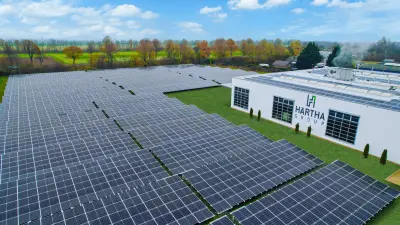
About the company
The HÄRTHA GROUP, founded in 1990, is headquartered in Aldenhoven in the German state of North Rhine-Westphalia. It ranks among Europe’s leading providers of metal finishing services that involve thermal treatment processes and coating solutions, which play important roles in the automotive industry, wind turbines and aerospace. HÄRTHA has more than 450 employees and deploys efficient, state-of-the-art systems at twelve production sites in Germany, Italy and the Netherlands.
What range of energy saving measures have you implemented?
Sven Killmer: There were simple things like installing motion sensors to control lighting. We have also optimized our washing and hardening processes in production and optimized heat recovery and the thermal insulation in the heating systems. One core aspect is optimizing the burning technologies in the various ovens. Bosch Climate Solutions compiled a list of the important technical, economic and environmental criteria for assessing this. Afterward we saw clearly that it was paying off. In several projects, annual gas consumption was slashed by up to an estimated ten percent by modernizing the burner technology, based on in-house assessments of energy performance. At current energy prices and with our operational parameters, about the estimated time for recouping the investment will be about two years.
That sounds pretty straightforward. But many companies are reluctant to adopt an energy efficiency strategy…
Sven Killmer: It may have something to do with the fact that, where the energy transformation is concerned, it’s a major challenge to get the ball rolling. You have to talk with customers, employees and other stakeholders about which path to take going forward. In my experience, it’s valuable for everyone concerned to exchange ideas. Implementing these changes can require an initial investment that can have repercussions on price structures all the way down through the delivery chain. But – and this fact is sometimes overlooked – all companies are now undergoing an energy transformation. In other words, over the short or long term they all need to optimize their supply chains. Those who act now also start meeting these customer requirements today and reap the benefits that much sooner. Which is why it’s so important for companies to get their sustainability efforts certified.
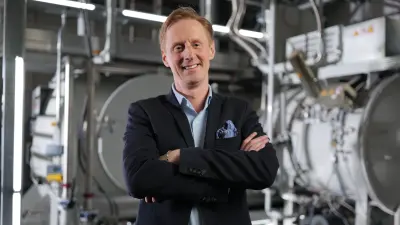
So your approach aims at aligning sustainability with the company’s long-term value?
Sven Killmer: I’ve spent my entire career working for midsized companies, and my philosophy as a corporate leader includes accepting responsibility. For our employees, for contributing to society and for protecting the climate, among other things. In 2016 the HÄRTHA GROUP comprised four companies that carried out relatively conventional heat treatments. And today we’re a modern industrial group with 12 subsidiaries. We had already implemented measures to recover heat and reduce energy consumption, among other things. But in recent years it had become more urgent to take action in this area, so we intensively addressed our energy supply. Strictly speaking, conserving resources has always been part of our business model. This fact is often overlooked when talking about “energy-intensive companies.” Our work protects products from wear and tear and extends their useful lives. We use our service to make components lighter but nevertheless robust, which supports forward-looking technologies such as electric mobility. You can say that sustainability, in addition to being an integral part of the HARTHA GROUP’s corporate philosophy, plays a key role in of all of our decisions.
What advice do you have for entrepreneurs wishing to develop an energy efficiency and sustainability strategy?
Sven Killmer: Find an experienced partner, address the theme of sustainability at your company and allocate funds for it in your annual budget. The investment pays off! We see this not just in our operational business but also, for example, in financing and in talks with investors. It also deserves to be mentioned that our activities in this area very positively influence how people view our corporate group.
What are your longer-term goals?
Sven Killmer: We want to obtain certifications to show how serious we are about this. As I mentioned, we’ve joined the SBTI initiative. The HÄRTHA GROUP has also committed itself to supporting the Paris Agreement’s 1.5°C target. We’re significantly ahead of it with our own specifications. This is also reflected in our first sustainability report, which presents the results we have already achieved with support from Bosch Climate Solutions. We’ve done our homework in many respects, and are about to start getting hydrogen-fueled systems ready for use. And we’re waiting for technological leaps, especially in the field of logistics. When we then start reequipping our vehicle fleet accordingly, Bosch Climate Solutions will also be the right partner for that.

